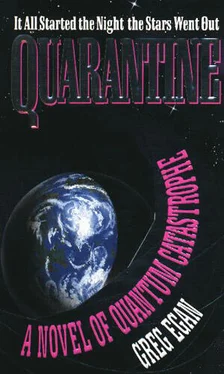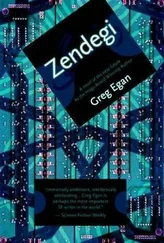Still, I have nothing better to do, so I search through the cargo records in the data I've collected so far, and come up with seven corpses.
The routine security X-rays taken of every passenger also provide the basis for computing the set of skeletal measurements used as an ID check. Corpses, though, aren't checked for ID; as with any other cargo, the X-ray images (a stereoscopic pair) are simply inspected by eye, then stored in the manifest. It takes me half an hour to track down a copy of the algorithm used by the airports to compute bone lengths; it's part of the X-ray machines' firmware, separate from the main passenger systems, so it isn't present in any of my stolen memory dumps. I wouldn't have wanted to cobble together a version of my own; the mathematics for converting data from stereo pairs to three-dimensional coordinates may be trivial, but automating the identification of the various bones is not.
I run the program on my seven corpses, checking for a match to Laura's data … and get seven consecutive negatives — perversely, just as I'm struck by a reason why the kidnappers might have chosen this path, after all. It's conceivable that Laura's brain damage prevented them from using a puppet mod; many off-the-shelf mods rely explicitly on the existence of certain neural structures which 'everyone' supposedly has in common, but which Laura might be lacking. No doubt any such problems could be circumvented, given time — but mapping Laura's non-standard brain, and reprogramming the nanomachines accordingly, would be no trivial matter. Other solutions would have looked tempting.
The lack of a positive result rules out nothing; the X-rays in the cargo record could have been fudged, a few minutes after they were taken. Computerized information is as evanescent as the quantum vacuum, with virtual truths and falsehoods endlessly popping in and out of existence. Deceptions of any magnitude are possible, on a short enough time scale; laws only apply to data that sits still long enough to be caught out.
I skim through the X-ray analysis program, curious to see how it works, but the code for anatomical-feature recognition is pretty dull stuff, an interminable list of rules and exceptions, and the rest is a few lines of formulae. I had a faint, nagging doubt that differences in geometry between the cargo and passenger X-ray systems might have been giving me garbage results, but in fact all the relevant dimensions are stored along with the image pairs themselves, neatly tagged with standard descriptors, and the program takes nothing for granted.
Once the bone lengths have been computed, a match is declared if any discrepancies fall within an age-dependent tolerance limit, which makes allowance for the possibility of small changes since the visa was issued. This tolerance is highest, of course, for children and adolescents, and not much leeway is granted at Laura's age — perhaps I should increase it? Customs may prefer to err on the side of false negatives, but I'd rather make the opposite mistake.
I realize my stupidity with a jolt: I'm still thinking in terms of passengers. A fake corpse doesn't need to be ambulatory. No skeletal reconstruction, however crippling, can be ruled out — which leaves me without a single piece of data I can trust.
That's not quite true. Most bones can be altered — if a period of convalescence is acceptable — but it's next to impossible to mess with certain parts of the skull, without the tampering being both dangerous and obvious.
I modify the match criteria, stripping away all the other comparisons. When I run this new version, a matching record appears at once: cargo id: 184309547 Flight: QANTAS 295
Departure: Perth, 13:06, December 23rd, 2067 Arrival: New Hong Kong, 14:22, December 23rd, 2067 Contents: Human remains [Han, Hsiu-lien]
Sender: New Hong Kong Consulate General 16 St George's Terrace Perth 6000-0030016 Australia
Addressee: Wan Chei Funerals 132 Lee Tung Street Wan Chei 1135-0940132 New Hong Kong
A match on the basis of five skull measurements could be a coincidence. It could be deliberate misinformation. Why wouldn't the kidnappers have altered the X-rays, wiping out even this hint of the truth?
I check the time the snapshot was taken. Twelve fifty-three. The cargo would have been X-rayed just two or three minutes before; you don't risk changing data when a Customs officer might be staring right at it. Ten minutes later, though, and every trace of Laura Andrews would have been gone.
I shake my head, still suspicious. I don't often get this lucky.
Karenleans over my shoulder and says, "That's the definition of luck, you moron. Hurry up and pack.'
New Hong Kong was founded on January 1st, 2029. Eighteen months before — on the thirtieth anniversary of Hong Kong's absorption into the People's Republic of China — demonstrations against the suspension of the Basic Law had ended in violent repression, a crackdown on dissent, and a massive increase in the rate of illegal emigration. While everyone else in the region offered the emigrants squalid refugee camps ringed with barbed wire, and the prospect of spending half their lives in a stateless limbo, the Tribal Confederation of Arnhem Land offered two thousand square kilometres on a mangrove-infested peninsula in northern Australia. No ninety-nine-year lease this time; sovereignty in perpetuity, in exchange for a piece of the action Arnhem Land, where the remnants of half a dozen Aboriginal tribes were trying to re-establish their near-obliterated culture, had been independent itself only since 2026, and there was talk in Australia of cutting off the aid that kept it afloat — partly in response to Chinese threats of trade sanctions, but also out of sheer childish resentment that the fledgling nation had dared to take its autonomy seriously. (The Australian government's own stunningly creative proposal had been to house sixty thousand refugees in a disused leper colony on the northwest coast, for however many decades it took to farm them out around the world at a politically acceptable rate.) The aid survived, but the project was widely ridiculed by the Australian media and their pet economists, who referred to it as 'subletting the nation', and predicted a social and financial disaster.
International investors thought otherwise; money flooded in. There was nothing humanitarian about this; it simply reflected the global economic situation at the time. The Koreans, especially, had been going crazy trying to find projects to soak up all their excess wealth. Creating the infrastructure from scratch must have been daunting, but the site was reasonably close to the booming industrial centres of south-east Asia, where there was engineering expertise and manufacturing capacity to spare. Making full use of new construction techniques, the core of the city was functional, and occupied, within seven years. Not a moment too soon: in 2036, the PRC invaded Taiwan, giving rise to a new wave of refugees.
In the decades that followed, cycles of political and economic reform came and went in Beijing, each one ending in an outflux of disillusioned members of the skilled middle class, with only one place to go. While China grew more impoverished and insular, New Hong Kong prospered. By 2056, its GDP had outstripped Australia's.
At Mach 2 plus, three thousand kilometres takes a little more than an hour. I'm far from any window, but I switch my entertainment screen to the scenic channel and watch the desert go by. I leave the headphones off, to avoid the fatuous audio commentary, but I can't work out how to make the distracting text and graphics overlays vanish. Eventually, I give up, and tell Bossto put me out of it until we arrive.
Monsoon rain pounds the runway as the plane touches down, but five minutes later I step out of the airport into dazzling sunshine and — after an hour of artificial, twenty-degree blandness — heat and humidity as palpable as a slap in the face.
Читать дальше










